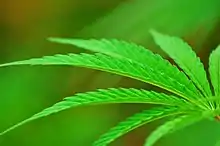Cannabis in Pakistan
Cannabis in Pakistan is illegal for recreational use, although since September 2020, extracts of cannabis can be used for industrial and medical use.[1][2] Cannabis is widely consumed in Pakistan as charas and bhang.

History
Before influence from the British and American governments,[3] cannabis was widely used within Central Asia medicinally, as a staple, for textile, and for psychotropic effects.[4] It was revered, as stated within the Atharvaveda, as one of five sacred plants [5] and it was believed that a guardian angel exists within it.
A 1983 report by the Pakistan Narcotics Control Board states that drug usage was largely stable in the 1950s-1970s with opium and cannabis being common, but there was an upsurge in cannabis usage by middle class youths in the late 1960s and early 1970s due to the influence of Western pop culture. However, by the 1980s the habit fell from fashion in the middle class.[6]
Criminalization
Under the Control of Narcotics Substance Act of 1997, it is illegal to produce, manufacture, extract, prepare, possess, offer for sale, sell, purchase or distribute cannabis in Pakistan. Although after acquiring a permit from provincial or federal government its cultivation is allowed for medical, scientific or industrial purposes. If found in violation of the above, it is punishable with imprisonment which may extend to seven years, with a fine, or with both.[7]
Enforcement of laws against hard drugs is prioritized in Pakistan, while the personal use of cannabis is often overlooked.[8] This is particularly true in various tribal regions of Pakistan, where cannabis is sometimes sold in public markets.[9][10]
Legal Status
On Tuesday, Sep 1st, 2020 the Federal Government of Pakistan approved the legalization of hemp production. This decision came after the realization of the fact that the country has a natural abundance of cannabis. Moreover, Pakistan can earn over one billion USD from its products. It can boost the economy of Pakistan.[11]
Usage
Cannabis is widely used in Pakistan, and smoked as charas (hashish) or consumed as a drink as bhang.[12] According to a 2013 report 6.4 million people in Pakistan consume cannabis.[13] With the legalization of Cannabidiol (CBD), the country is looking ahead to export non-psychoactive hemp and other derivatives to international markets.[14]
References
- "In 'landmark decision', Pakistan approves industrial use of cannabis and hemp". Hindustan Times. 2020-09-03. Retrieved 2020-09-06.
- "In a first, govt allows industrial and medical use of cannabis extract". The Express Tribune. 1 September 2020. Retrieved 3 September 2020.
- Bapat, Sharda N (2015). "Cannabis: the Forgotten Sacred Plant of India". Atreya Ayurveda Publications. Retrieved 1 June 2019.
- Touw, Mia (January 1981). "The Religious and Medicinal Uses of in China, India and Tibet". Journal of Psychoactive Drugs. 13 (1): 23–34. doi:10.1080/02791072.1981.10471447. PMID 7024492.
- Aldrich, Michael R. (1977). "Tantric cannabis use in India". Journal of Psychedelic Drugs. 4 (3): 227–233. doi:10.1080/02791072.1977.10472053. Retrieved 1 June 2019.
- Pakistan Narcotics Control Board (1983). International Conference on Demand and Supply of Opiates in Pakistan: proceedings. Pakistan Narcotics Control Board. p. 43.
- "Control of Narcotics Substance Act, 1997" (PDF).
- Karimjee, Mariya (27 February 2013). "In conservative Pakistan, everybody must get stoned". Public Radio International. Retrieved 31 July 2018.
- "Cannabis in Pakistan". Sensi Seeds. Retrieved 31 July 2018.
- "A Visit to Peshawar and the Tribal Areas of Pakistan". Cannabis Culture. 18 November 2009. Retrieved 31 July 2018.
- Abubakar, Rana (2020-09-03). "How Legalization of Hemp Production can Boost Pakistan's Economy?". The Logical World. Retrieved 2020-12-23.
- Vera Rubin (1 January 1975). Cannabis and Culture. Walter de Gruyter. pp. 347–. ISBN 978-3-11-081206-0.
- "Doing hash? Think again". Retrieved 2017-09-03.
- "Pakistan plans to tap into $25b legal cannabis market". www.thenews.com.pk. Retrieved 2020-09-06.